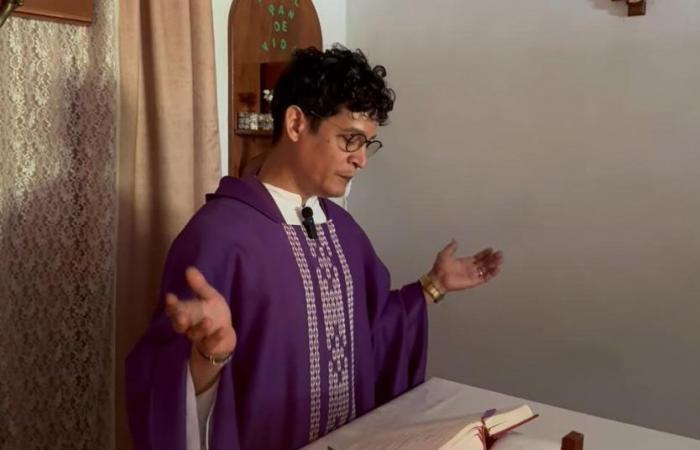Havana/Catholic priest Leandro Naun cares for a handful of rural communities in Santiago de Cuba. The end of the month is coming and people, by word of mouth, are passing a message: the basic basket is taking a while and it is not even known if it will arrive. It doesn’t matter. At full speed in a gray Toyota, Naun is handing out spaghetti, chocolate, flour and guarapo. He has a bread baking course with few resources, he puts a squad of children to make jam and he knows that May water cures a belly ache.
Nobody knows where he gets the energy from; The money comes from former parishioners who now live abroad and who continue to help him. Few priests have recorded so thoroughly what life is like in the mountains of Santiago. He does hard journalism – almost war – without the slightest intention. Watch, record and reflect. But if it were up to him, he says to 14ymediowould have spent all this time in a clearing in the Darien jungle, giving encouragement to the Cubans who are making their way through the undergrowth to reach the North.
Naun was born in El Cobre, the mining town where the sanctuary of the Virgin of Charity is located. El Cobre is a strange and mixed place: Catholicism and the different Afro-Cuban beliefs converge there. It is also one of the poorest towns in Cuba, despite the movement of tourists and pilgrims to the temple of the patron saint of Cuba.
“Violence will continue to increase and is directly proportional to the frustration, helplessness and discomfort experienced by the population”
Raised in the mountains, Naun is still in them. He sees with concern where he is going, the entire Island, in general, and the part of it that he has lived in: the East. To illustrate the tension in the atmosphere, he says that he recently discovered a “poor man” stealing in the garden of his house. “He left me cold, petrified,” he says. “’You’re fine and I’m sick!’ He told me. Perceiving me in a better situation than his was enough to justify that he had the right to rob me. Others will tell you: ‘You go by car and I’ll go on foot!’ But I am not responsible for your situation! ”He argues.
The key is to understand the “repressed helplessness” that Cubans have, who vent their frustration with a machete if necessary. You can see it in the looks of the people, in the harsh expressions that are thrown around, even among neighbors and relatives. You don’t have to look far to find an example: exactly one year ago, three masked thieves broke into his parents’ house on the outskirts of Santiago, and in their escape they beat his mother and hacked his father with a machete.
“My father survived that attack that almost cost him his life,” recalls Naun, and warns that “violence will continue to increase and is directly proportional to the frustration, helplessness and unrest experienced by the population.”
“The general mood is at the bottom,” he concludes. “Perhaps the days of parties and drunkenness are a pause in the midst of so much suffering, like the days of rest of the black slave of the mill: ‘How good the master is!’, they said while they danced as if tomorrow did not exist. The memory of yesterday is fragile in the poor.”
Many Cubans, he clarifies, have no idea how information works in the remote areas of the East. For the majority, “the news almost always comes to them through Facebook or they watch it on YouTube. A sieve is needed to separate the objective and the subjectivity of the person who informs or tries to inform. Murders, robberies, assaults, missing persons, accidents… tend to increase on the networks, but on the street we live another reality, another version of life. In places without internet access it is another world narrated by the official press.”
Mothers who have a child imprisoned keep silent about it, they have “the cry of Job – the biblical character who loses everything – stuck in their throat.” To many, “God seems deaf to them” because they do not see a way out of their situation and they become desperate. “Why does it have to be like this?” protests the priest.
In that context, he considers, temples have to be a place for tolerance. “On the same bench sits the head of the Federation of Cuban Women, the head of the Committee for the Defense of the Revolution and a mother with her son imprisoned since July 11.” He has the duty to speak for everyone, “like the sun that rises every morning on the just and the unjust.”
And the Conference of Bishops? What is she doing and why does she seem paralyzed? “Only God knows what they really do at those levels, what they say to each other, what they promise… The rest is opinion. The dialogues and negotiations at the highest level will always be secret and we can really know very little about the issues they talk about,” he explains. Of course, it misses the times when the Church had two interlocutors who waged war – one combative, the other diplomatic – against the regime on two fronts: Archbishop Pedro Meurice, in Santiago, and Cardinal Jaime Ortega, in Havana.
“Every day is an adventure. In my videos I try to chronicle what I am experiencing. It is like an archive of memories of what people are like, what they do, how they live”
Many priests and nuns have also fled misery in Cuba. Naun does not criticize them, because “Cuba is not the center of the world” and those who feel that they are missionaries – as is the case with many Cuban religious people – have to travel. Leaving doesn’t free you from Cuba either, he explains. There is a kind of chip of the nostalgia that chains the emigrant, not to mention the family that is left behind and of which no one ignores.
He admires those who have stayed despite pressure from the Government and State Security, like Nadieska Almeida or Alberto Reyes. They are “like voices crying out in the desert” – or in the darkness, as Reyes said – and they have to endure “misunderstandings from one side and the other, from one shore and the other.”
“Having options is being free,” says Naun. His option was not to leave – not even to Darién – but to the mountains of Santiago. “Every day is an adventure. In my videos I try to chronicle what I am experiencing. It is like an archive of memories of what people are like, what they do, how they live.” It is true, he affirms, that “every day we must improvise, change and reorient the path.”
“Everything is unstable in my work environment. Everything is fragile and ephemeral like the grass of the field. Everything is dangerous: saying, thinking or acting.” It is not an idyllic life, but it must be lived – Naun considers – with all the joy in the world. “There is nothing more subversive than living and being happy where many are barely surviving.”






